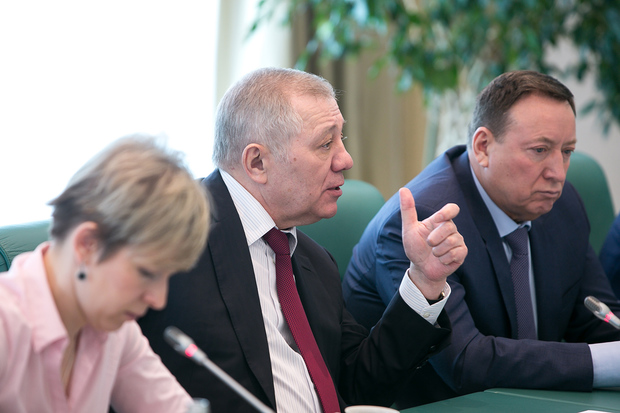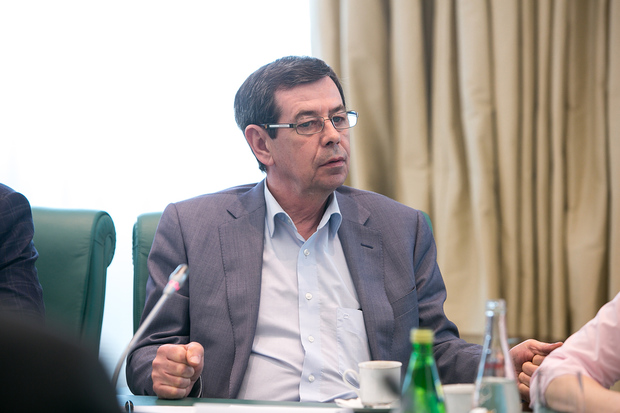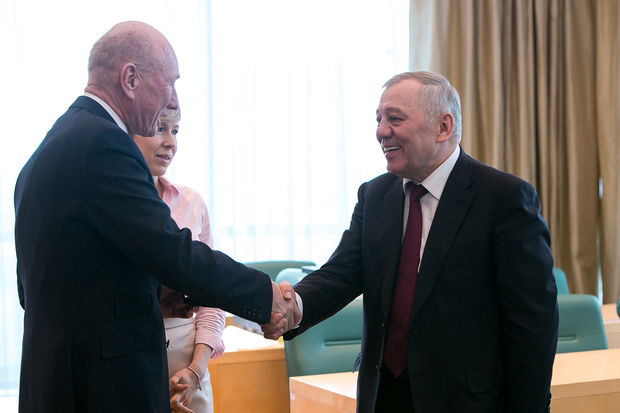John Derbyshire, KBR T&C: ‘Many specialists around the world watch the project at TAIF-NK’
This autumn, a new complex of multi-industry holding will be able to process the oil residues — tar and mazut — in diesel fuel of Euro-5 standard and straight-run gasoline
'It's like the launch of a spacecraft with a person. We have no right to be mistaken,' commented the start of operation of the complex of advanced refining of heavy residues the head of TAIF Albert Shigabutdinov at the meeting with the partners — the American company KBR T&C. The company-licensor of the base technology headed by its President John Derbyshire arrived in Kazan to meet with top managers of the group of companies and to discuss all issues of the forthcoming autumn launch of the ambitious project, which will make the refining almost waste-free. The correspondent of the online newspaper Realnoe Vremya became a witness of the negotiations.
The hardest of the hard
'We knew it and were prepared for the fact that this project is not easy. However, it was even harder than we thought,' said the head of TAIF JSC Albert Shigabutdinov, after he welcomed the delegation from the American company KBR T&C, which is the licensor of the technology Veba Combi Chased (VCC). This technology is the backbone of the Complex of advanced refining of heavy residues at TAIF-NK. This project will be the first in Russia and the world's largest production based on VCC technology. Recently, the construction of two small, significantly less powerful by volume of feedstock, pilot plants in China based on the same technology has finished.
'I wanted to start with the same – with the complexity of the VCC plant,' John Derbyshire, the president of KBR T&C, kept up the conversation. His company with a total staff of 27 000 people in more than 70 countries on five continents is one of the largest companies in the world in the field of engineering, procurement and construction. The company's history began when cars were a rarity and the primary mean of communication was the telegraph.
Today, KBR T&C is actively engaged in the largest and most innovative projects of the global scale, many of which are implemented in remote areas with severe natural conditions.
'When two years ago I came to Kazan, oil cost $127 per barrel. The changes are drastic. Today everything is in a difficult situation and suffering from reduced oil prices. Nevertheless, we see you have a great progress in the start of the VCC technology. Many specialists around the world watch this project at TAIF-NK. And one of the tasks of our meeting is to discuss all issues and potential problems after the start of the technology. We also need to make the detailed plan for the launch,' said John Derbyshire, assuring in his personal interest in the successful implementation of the project. 'After the technology start, the refinery plant of TAIF-NK will be the most successful in the world,' said the president of the KBR T&C.

Albert Shigabutdinov: 'We knew it and were prepared for the fact that this project is not easy. However, it was even harder than we thought … It's like the launch of a spacecraft with a person. We have no right to be mistaken.'
The complex will allow achieving almost non-waste oil processing. After the three-step conversion of heavy residues into synthetic oil by the VCC technology, the product will undergo the standard process of hydrocracking in a static bed of catalyst. The result will be highly profitable white petroleum products: propane and butane fractions, naphtha, diesel fuel of eco-standard Euro-5, as well as refined vacuum gas oil, which is the main raw material for the production of gasoline Euro-5. The introduction of the complex will bring nearly doubled profits.
The VCC technology exists since the 1930s and was developed in Germany for the processing of coal into motor gasoline at a pressure of 750 atmospheres.
Later, this technology, capable of processing a wide range of types of heavy raw materials, but at high pressure, was forgotten: at that time, enough of light oil was extracted, from which the obtaining of white oil products did not require special technologies and, most importantly, cost much cheaper. However, at the beginning of 2000s, the BP company returned to this technology and updated it. As a result, it has become possible to process heavy raw materials at a much lower pressure of 210 atmospheres. In 2010, the BP company transferred to the American company KBR the right to distribute the license and the technology worldwide.
'The technology itself does not raise doubts. But we have some questions…'
Interested head of the company-licensor asked when the launch of the entire complex is expected. The Deputy Director General of TAIF JSC on petrochemistry and oil refining Vladimir Presnyakov replied: 'We are planning the first supply of raw materials in September. To reach industrial operation we need in the middle of November or no later than December.' Nevertheless, all that has no circulation of the industrial scale raises concerns.

Vladimir Presnyakov: 'We are planning the first supply of raw materials in September. To reach industrial operation we need in the middle of November or no later than December.'
'The technology itself does not raise doubts. But we have some questions about engineering support – about the work of all purchased equipment. The second point: how will the licensed high pressure-relief valves work? And next one — the staff training. Of course, we also conduct education and trainings. To the extent that our specialists are trained to disassemble and assemble back valves within 4 hours. And, nevertheless, when you run such a powerful plant, you need to eliminate all possible mistakes and problems,' said Vladimir Presnyakov. 'Yes, it's like the launch of a spacecraft with a person, we have no right to be mistaken,' commented Albert Shigabutdinov.
Besides, during the discussion the partners often referred to the experience of China, which having implemented the VCC plant, faced the problems. 'We had difficulties in communicating with the clients. They didn't want such close collaboration that we have with you. Also, they started to use other raw materials, not one what was originally designed,' explained the causes of the complications at the Chinese production Steve Mayo, the director on the VCC technology at KBR T&C.
It was decided to discuss more details of the upcoming launch directly at the site of the complex of advanced refining of heavy residues in Nizhnekamsk, where the American company has also planned to visit Nizhnekamskneftekhim and to discuss possible cooperation in the construction of ethylene complex, to be exact — the construction of two pyrolysis furnaces. 'Besides, based on the information we have, the main task of NKNK is to maximize the production of benzene, butadiene and butylene-isobutylene fraction. We would like to be helpful in this direction,' said John Derbyshire.
Read more about the interests of the company KBR T&C in Russia in the forthcoming interview of Realnoe Vremya, and the details about the projects of two largest holdings KBR T&C and TAIF — in our next articles.
